Omega-3 fatty acids for depression in adults
- PMID: 34817851
- PMCID: PMC8612309
- DOI: 10.1002/14651858.CD004692.pub5
Omega-3 fatty acids for depression in adults
Abstract
Background: Major depressive disorder (MDD) is highly debilitating, difficult to treat, has a high rate of recurrence, and negatively impacts the individual and society as a whole. One potential treatment for MDD is n-3 polyunsaturated fatty acids (n-3PUFAs), also known as omega-3 oils, naturally found in fatty fish, some other seafood, and some nuts and seeds. Various lines of evidence suggest a role for n-3PUFAs in MDD, but the evidence is far from conclusive. Reviews and meta-analyses clearly demonstrate heterogeneity between studies. Investigations of heterogeneity suggest different effects of n-3PUFAs, depending on the severity of depressive symptoms, where no effects of n-3PUFAs are found in studies of individuals with mild depressive symptomology, but possible benefit may be suggested in studies of individuals with more severe depressive symptomology. Hence it is important to establish their effectiveness in treating MDD. This review updates and incorporates an earlier review with the same research objective (Appleton 2015).
Objectives: To assess the effects of n-3 polyunsaturated fatty acids (also known as omega-3 fatty acids) versus a comparator (e.g. placebo, antidepressant treatment, standard care, no treatment, wait-list control) for major depressive disorder (MDD) in adults.
Search methods: We searched the Cochrane Central Register of Controlled trials (CENTRAL), Ovid MEDLINE, Embase and PsycINFO together with trial registries and grey literature sources (to 9 January 2021). We checked reference lists and contacted authors of included studies for additional information when necessary.
Selection criteria: We included studies in the review if they: used a randomised controlled trial design; provided n-3PUFAs as an intervention; used a comparator; measured depressive symptomology as an outcome; and were conducted in adults with MDD. Primary outcomes were depressive symptomology (continuous data collected using a validated rating scale) and adverse events. Secondary outcomes were depressive symptomology (dichotomous data on remission and response), quality of life, and non-completion of studies.
Data collection and analysis: We used standard methodological procedures as expected by Cochrane. We assessed the certainty of the evidence using GRADE criteria.
Main results: The review includes 35 relevant studies: 34 studies involving a total of 1924 participants investigated the impact of n-3PUFA supplementation compared to placebo, and one study involving 40 participants investigated the impact of n-3PUFA supplementation compared to antidepressant treatment. For the placebo comparison, n-3PUFA supplementation resulted in a small to modest benefit for depressive symptomology, compared to placebo: standardised mean difference (SMD) (random-effects model) -0.40 (95% confidence interval (CI) -0.64 to -0.16; 33 studies, 1848 participants; very low-certainty evidence), but this effect is unlikely to be clinically meaningful. An SMD of 0.40 represents a difference between groups in scores on the HDRS (17-item) of approximately 2.5 points (95% CI 1.0 to 4.0), where the minimal clinically important change score on this scale is 3.0 points. The confidence intervals include both a possible clinically important effect and a possible negligible effect, and there is considerable heterogeneity between studies. Sensitivity analyses, funnel plot inspection and comparison of our results with those of large well-conducted trials also suggest that this effect estimate may be biased towards a positive finding for n-3PUFAs. Although the numbers of individuals experiencing adverse events were similar in intervention and placebo groups (odds ratio (OR) 1.27, 95% CI 0.99 to 1.64; 24 studies, 1503 participants; very low-certainty evidence), the confidence intervals include a small decrease to a modest increase in adverse events with n-3PUFAs. There was no evidence for a difference between n-3PUFA and placebo groups in remission rates (OR 1.13, 95% CI 0.74 to 1.72; 8 studies, 609 participants, low-certainty evidence), response rates (OR 1.20, 95% CI 0.80 to 1.79; 17 studies, 794 participants; low-certainty evidence), quality of life (SMD -0.38 (95% CI -0.82 to 0.06), 12 studies, 476 participants, very low-certainty evidence), or trial non-completion (OR 0.92, 95% CI 0.70 to 1.22; 29 studies, 1777 participants, very low-certainty evidence). The evidence on which these results are based was also very limited, highly heterogeneous, and potentially biased. Only one study, involving 40 participants, was available for the antidepressant comparison. This study found no differences between treatment with n-3PUFAs and treatment with antidepressants in depressive symptomology (mean difference (MD) -0.70, 95% CI -5.88 to 4.48), rates of response to treatment (OR 1.23, 95% CI 0.35 to 4.31), or trial non-completion (OR 1.00, 95% CI 0.21 to 4.71). Confidence intervals are however very wide in all analyses, and do not rule out important beneficial or detrimental effects of n-3PUFAs compared to antidepressants. Adverse events were not reported in a manner suitable for analysis, and rates of depression remission and quality of life were not reported.
Authors' conclusions: At present, we do not have sufficient high-certainty evidence to determine the effects of n-3PUFAs as a treatment for MDD. Our primary analyses may suggest a small-to-modest, non-clinically beneficial effect of n-3PUFAs on depressive symptomology compared to placebo; however the estimate is imprecise, and we judged the certainty of the evidence on which this result is based to be low to very low. Our data may also suggest similar rates of adverse events and trial non-completion in n-3PUFA and placebo groups, but again our estimates are very imprecise. Effects of n-3PUFAs compared to antidepressants are very imprecise and uncertain. More complete evidence is required for both the potential positive and negative effects of n-3PUFAs for MDD.
Trial registration: ClinicalTrials.gov NCT00116857 NCT03072823 NCT00256412 NCT00067301 NCT02057406 NCT00361374 NCT00517036 NCT00096798 NCT00963196 NCT00816322 NCT01371383 NCT00480207 NCT03295708 NCT01235533 NCT03899194 NCT00289484 NCT02553915 NCT00167310 NCT03732378.
Copyright © 2021 The Cochrane Collaboration. Published by John Wiley & Sons, Ltd.
Conflict of interest statement
KA: None known PV: None known HS: None known SD: Is an Information Specialist for Cochrane Common Mental Disorders but was not involved in the editorial approval process for this review. AN: None known RC: Leads and has responsibility for Cochrane Common Mental Disorders, which has supported parts of the review process and is largely funded by a grant from the National Institute for Health Research (NIHR) in the UK. RC was not involved in the editorial process for this review. RP: None known
Figures
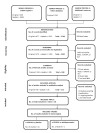
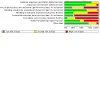
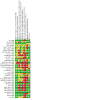
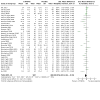
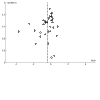
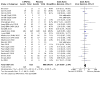
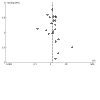
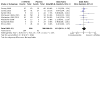
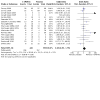
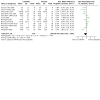
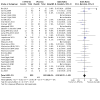
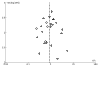
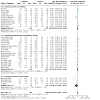
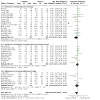
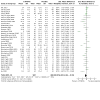
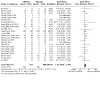
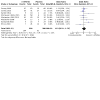
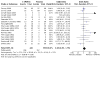
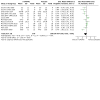
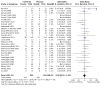
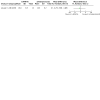
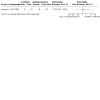
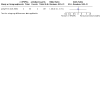
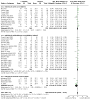
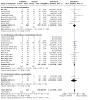
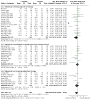
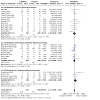
Update of
-
Omega-3 fatty acids for depression in adults.Cochrane Database Syst Rev. 2015 Nov 5;2015(11):CD004692. doi: 10.1002/14651858.CD004692.pub4. Cochrane Database Syst Rev. 2015. Update in: Cochrane Database Syst Rev. 2021 Nov 24;11:CD004692. doi: 10.1002/14651858.CD004692.pub5 PMID: 26537796 Free PMC article. Updated. Review.
Similar articles
-
Omega-3 fatty acids for depression in adults.Cochrane Database Syst Rev. 2015 Nov 5;2015(11):CD004692. doi: 10.1002/14651858.CD004692.pub4. Cochrane Database Syst Rev. 2015. Update in: Cochrane Database Syst Rev. 2021 Nov 24;11:CD004692. doi: 10.1002/14651858.CD004692.pub5 PMID: 26537796 Free PMC article. Updated. Review.
-
Folic acid supplementation and malaria susceptibility and severity among people taking antifolate antimalarial drugs in endemic areas.Cochrane Database Syst Rev. 2022 Feb 1;2(2022):CD014217. doi: 10.1002/14651858.CD014217. Cochrane Database Syst Rev. 2022. PMID: 36321557 Free PMC article.
-
ω-3 Fatty acids for major depressive disorder in adults: an abridged Cochrane review.BMJ Open. 2016 Mar 2;6(3):e010172. doi: 10.1136/bmjopen-2015-010172. BMJ Open. 2016. PMID: 26936905 Free PMC article. Review.
-
Antidepressants for the treatment of depression in people with cancer.Cochrane Database Syst Rev. 2018 Apr 23;4(4):CD011006. doi: 10.1002/14651858.CD011006.pub3. Cochrane Database Syst Rev. 2018. Update in: Cochrane Database Syst Rev. 2023 Mar 31;3:CD011006. doi: 10.1002/14651858.CD011006.pub4 PMID: 29683474 Free PMC article. Updated. Review.
-
New generation antidepressants for depression in children and adolescents: a network meta-analysis.Cochrane Database Syst Rev. 2021 May 24;5(5):CD013674. doi: 10.1002/14651858.CD013674.pub2. Cochrane Database Syst Rev. 2021. PMID: 34029378 Free PMC article.
Cited by
-
Antidepressant-like Effects of Representative Types of Food and Their Possible Mechanisms.Molecules. 2023 Oct 9;28(19):6992. doi: 10.3390/molecules28196992. Molecules. 2023. PMID: 37836833 Free PMC article. Review.
-
Optimal omegas - barriers and novel methods to narrow omega-3 gaps. A narrative review.Front Nutr. 2024 Feb 2;11:1325099. doi: 10.3389/fnut.2024.1325099. eCollection 2024. Front Nutr. 2024. PMID: 38371504 Free PMC article. Review.
-
rTMS ameliorates depressive-like behaviors and regulates the gut microbiome and medium- and long-chain fatty acids in mice exposed to chronic unpredictable mild stress.CNS Neurosci Ther. 2023 Nov;29(11):3549-3566. doi: 10.1111/cns.14287. Epub 2023 Jun 2. CNS Neurosci Ther. 2023. PMID: 37269082 Free PMC article.
-
Dietary fatty acids improve perceived sleep quality, stress, and health in migraine: a secondary analysis of a randomized controlled trial.Front Pain Res (Lausanne). 2023 Oct 25;4:1231054. doi: 10.3389/fpain.2023.1231054. eCollection 2023. Front Pain Res (Lausanne). 2023. PMID: 37954068 Free PMC article.
-
A Revision on the Effectiveness of Omega-3 Polyunsaturated Fatty Acids as Monotherapy in the Treatment of Major Depressive Disorder.Int J Clin Pract. 2022 Nov 16;2022:3801235. doi: 10.1155/2022/3801235. eCollection 2022. Int J Clin Pract. 2022. PMID: 36474548 Free PMC article. Review.
References
References to studies included in this review
Bot 2010 {published data only}30877831
-
- Bot M, Pouwer F, Assies J, Jansen E, Beekman AT, De Jonge P. Supplementation with eicosapentaenoic omega-3 fatty acid does not influence serum brain-derived neurotrophic factor in diabetes mellitus patients with major depression: a randomized controlled pilot study. Neuropsychobiology 2011;63(4):219-23. - PubMed
-
- Bot M, Pouwer F, Assies J, Jansen E, Diamant M, Snoek FJ, et al. Eicosapentaenoic acid as an add-on to antidepressant medication for co-morbid major depression in patients with diabetes mellitus: a randomized, double-blind placebo-controlled study [ISRCTN30877831; NTR624]. Journal of Affective Disorders 2010;126(1-2):282-6. - PubMed
-
- Pouwer F. Addition of eicosapentaenoic acid to maintenance anti-depressant therapy in diabetes patients with major depressive disorder: a double-blind, placebo-controlled pilot study. www.controlled-trials.com/ISRCTN30877831 (Accessed 21 August 2014).
Carney 2009 {published data only}
-
- Anonymous. News breaks. Nutrition Today 2009;44(6):234-5.
-
- Anonymous. Use of omega-3 with treatment for depression in heart disease patients may not provide benefit. Nurse Prescribing 2009;7(11):523-4.
-
- Carney RM, Freedland KE, Steinmeyer BC. 'Omega-3 fatty acids for CHD with depression': Reply to comment. JAMA 2010;303(9):836. - PubMed
Carney 2020 {published and unpublished data}
-
- Anon. EPA with antidepressant did not improve treatment efficacy in cardiac patients. Brown University Psychopharmacology Update 2019;Sept.
-
- Carney RM, Freedland KE, Rubin EH, Rich MW, Steinmeyer BC, Harris WS. A randomized placebo-controlled trial of Omega-3 and sertraline in depressed patients with or at risk for coronary heart disease. Journal of Clinical Psychiatry 2019;80(4):19m12742. [PMID: doi: 10.4088/JCP.19m12742] - PMC - PubMed
-
- NCT02021669. Omega-3 for depression and other cardiac risk factors - 2 (Omega-3(2)). clinicaltrials.gov/ct2/show/NCT02021669 (first received 27 December 2013).
Chang 2020 {published and unpublished data}
-
- Chang JP, Chang SS, Chen HT, Su KP, Pariante CM. A double blind-placebo controlled trial of omega-3 polyunsaturated fatty acids (n-3 PUFAs) in patients with cardiovascular diseases (CVDs) and comorbid major depressive disorder (MDD). Nutritional Neuroscience 2018;21:S11.
-
- Chang JP, Chang SS, Yang HT, Chen HT, Chien YC, Yang B, et al. Omega-3 polyunsaturated fatty acids in cardiovascular diseases comorbid major depressive disorder - Results from a randomized controlled trial. Brain, Behavior, and Immunity 2020;85:14-20. - PubMed
-
- NCT03072823. Omega-3 polyunsaturated fatty acids on major depressive disorder in patients with cardiovascular diseases. NCT03072823 (first received 17 March 2017).
Coryell (1g/d) 2005 {unpublished data only}
-
- Coryell WH. Essential fatty acids for major depression. ClinicalTrials.gov/show/NCT00256412 (First received 21 November 2005).
Coryell (2g/d) 2005 {unpublished data only}
-
- Coryell WH. Essential fatty acids for major depression. ClinicalTrials.gov/show/NCT00256412 (Accessed 22/07/2014).
Da Silva (AD) 2005 {published and unpublished data}
-
- Da Silva TM, Munhoz RP, Alvarez C, Naliwaiko K, Kiss A, Andreatini R, et al. Depression in Parkinson's disease: a double-blind, randomized, placebo-controlled pilot study of omega-3 fatty-acid supplementation. Journal of Affective Disorders 2008;111(2-3):351-9. - PubMed
Da Silva (nAD) 2005 {published data only}
-
- Da Silva TM, Munhoz RP, Alvarez C, Naliwaiko K, Kiss A, Andreatini R, et al. Depression in Parkinson's disease: a double-blind, randomized, placebo-controlled pilot study of omega-3 fatty-acid supplementation. Journal of Affective Disorders 2008;111(2-3):351-9. - PubMed
Gertsik 2012 {published data only}
-
- Gertsik L. PUFA augmentation in treatment of major depression. ClinicalTrials.gov/show/NCT00067301 (First received 15 August 2003).
Gharekhani 2014 {published and unpublished data}
-
- Dashti-Khavidaki S, Gharekhani A, Khatami M-R, Miri E-S, Khalili H, Razeghi E, et al. Effects of omega-3 fatty acids on depression and quality of life in maintenance hemodialysis patients. American Journal of Therapeutics 2014;21(4):275-87. - PubMed
-
- Gharekhani A, Khatami M-R, Dashti-Khavidaki S, Razeghi E, Noorbala A-A, Hashemi-Nazari S-S, et al. The effect of omega-3 fatty acids on depressive symptoms and inflammatory markers in maintenance hemodialysis patients: a randomized, placebo-controlled clinical trial. European Journal of Clinical Pharmacology 2014;70(6):655-65. - PubMed
-
- IRCT201202203043N5. Evaluating therapeutic effects of omega-3 fatty acids on anemia and nutritional status in hemodialysis patients with depression. en.irct.ir/trial/3051 (first received 10 April 2012).
Gonzalez 2011 {published data only}
-
- Gonzalez A, Mata S, Sanchez P, Gonzalez D, Urbina M, Fazzino F, et al. Omega-3 fatty acids as adjunctive of antidepressant therapy and its effects on brain-derived neurotrophic factor in serum, monocytes and lymphocytes. Archivos Venezolanos de Farmacologia y Terapeutica 2011;30(4):72-8.
Grenyer 2007 {published data only}
-
- Grenyer BF, Crowe T, Meyer B, Owen AJ, Grigonis-Deane EM, Caputi P, et al. Fish oil supplementation in the treatment of major depression: a randomised double-blind placebo-controlled trial. Progress in Neuro-psychopharmacology & Biological Psychiatry 2007;31(7):1393-6. - PubMed
-
- Meyer BJ, Grenyer BF, Crowe T, Owen AJ, Grigonis-Deane EM, Howe PR. Improvement of major depression is associated with increased erythrocyte DHA. Lipids 2013;48(9):863-8. - PubMed
-
- Rotblatt M, Grenyer BFS. Fish oil not effective for chronic refractory depression. Focus on Alternative & Complementary Therapies 2008;13(1):30-1.
Jahangard 2018 {published data only}Irct201705249014N
-
- Irct201705249014N. Effect of omega-3-fatty acids versus placebo on clinical symptoms of patients with major depressive disorder. Irct201705249014N.
-
- Jahangard L, Sadeghi A, Ahmadpanah M, Holsboer-Trachsler E, Sadeghi Bahmani D, Haghighi M, et al. Influence of adjuvant omega-3-polyunsaturated fatty acids on depression, sleep, and emotion regulation among outpatients with major depressive disorders - results from a double-blind, randomized and placebo-controlled clinical trial. Journal of Psychiatric Research 2018;107:48-56. - PubMed
Jazayeri (v AD) 2008 {published data only}
-
- Jazayeri S, Keshavarz SA, Tehrani-Doost M, Djalali M, Hosseini M, Amini H, et al. Effects of eicosapentaenoic acid and fluoxetine on plasma cortisol, serum interleukin-1beta and interleukin-6 concentrations in patients with major depressive disorder. Psychiatry Research 2010;178(1):112-5. - PubMed
-
- Jazayeri S, Tehrani-Doost M, Keshavarz SA, Hosseini M, Djazayery A, Amini H, et al. Comparison of therapeutic effects of omega-3 fatty acid eicosapentaenoic acid and fluoxetine, separately and in combination, in major depressive disorder. Australian and New Zealand Journal of Psychiatry 2008;42(3):192-8. - PubMed
Jazayeri (v placebo) 2008 {published data only}
-
- Jazayeri S, Keshavarz SA, Tehrani-Doost M, Djalali M, Hosseini M, Amini H, et al. Effects of eicosapentaenoic acid and fluoxetine on plasma cortisol, serum interleukin-1beta and interleukin-6 concentrations in patients with major depressive disorder. Psychiatry Research 2010;178(1):112-5. - PubMed
-
- Jazayeri S, Tehrani-Doost M, Keshavarz SA, Hosseini M, Djazayery A, Amini H, et al. Comparison of therapeutic effects of omega-3 fatty acid eicosapentaenoic acid and fluoxetine, separately and in combination, in major depressive disorder. Australian and New Zealand Journal of Psychiatry 2008;42(3):192-8. - PubMed
Jiang (EPA+DHA) 2018 {published data only}
-
- Jiang W, Whellan DJ, Adams KF, Babyak MA, Boyle SH, Wilson JL, et al. Long-chain omega-3 fatty acid supplements in depressed heart failure patients: results of the OCEAN trial. JACC Heart Failure 2018;6(10):833-43. - PubMed
-
- NCT02057406. Omega 3 for treatment of depression in patients with heart failure (OCEAN). clinicaltrials.gov/ct2/show/NCT02057406 (first received 7 February 2014).
Jiang (EPA only) 2018 {published data only}
-
- Jiang W, Whellan DJ, Adams KF, Babyak MA, Boyle SH, Wilson JL, et al. Long-chain omega-3 fatty acid supplements in depressed heart failure patients: results of the OCEAN trial. JACC Heart Failure 2018;6:833-43. - PubMed
-
- Jiang W. Omega 3 for treatment of depression in patients with heart failure (OCEAN). ClinicalTrials.gov/show/NCT02057406 (first received 7 February 2014).
Kamath 2017 {published data only}
-
- Kamath J. Omega 3 FA supplements as augmentation in the treatment of depression. ClinicalTrials.gov/show/NCT01803711 (first received 04 March 2013).
Lespérance 2011 {published data only}47431149
-
- Lespérance F, Frasure-Smith N, St-André E, Turecki G, Lesperance P, Wisniewski SR. The efficacy of omega-3 supplementation for major depression: A randomized controlled trial [ISRCTN47431149]. Journal of Clinical Psychiatry 2011;72(8):1054-62. - PubMed
-
- Lespérance F. Double-blind, placebo-controlled, randomised trial of eicosapentaenoic acid (EPA) for major depression. www.controlled-trials.com/ISRCTN47431149/ (Accessed 21 August 2014).
Lucas 2009 {published data only}69617477
-
- Lucas M, Asselin G, Mérette C, Poulin MJ, Dodin S. Ethyl-eicosapentaenoic acid for the treatment of psychological distress and depressive symptoms in middle-aged women: a double-blind, placebo-controlled, randomized clinical trial. American Journal of Clinical Nutrition 2009;89(2):641-51. - PubMed
-
- Lucas M. Double-blind, placebo-controlled, randomised, clinical trial of eicosapentaenoic acid in the treatment of mood disorders among middle-aged women. www.controlled-trials.com/ISRCTN69617477 (Accessed 21 August 2014).
Marangell 2003 {published data only}
-
- Marangell LB, Martinez JM, Zboyan HA, Kertz B, Kim HF, Puryear LJ. A double-blind, placebo-controlled study of the omega-3 fatty acid docosahexaenoic acid in the treatment of major depression. American Journal of Psychiatry 2003;160(5):996-8. - PubMed
-
- Marangell LB, Zboyan HA, Cress KK, Benisek D, Arterburn L. A double-blind, placebo-controlled study of docosahexaenoic acid (DHA) in the treatment of depression. In: 4th Congress of the International Society for the Study of Lipids and Fatty Acids, Tsukuba, Japan. 2000:105.
Masoumi 2016 {published data only}IRCT2013052113405N1
-
- IRCT2013052113405N1. Comperssion with the combined effects of omega _3 and citalopram for depression during menopause in postmenopausal women referred to health centers in Hamadan city in 1391: a double-blind clinical trial. IRCT2013052113405N1 (first received 22 July 2013).
Mazereeuw 2016 {published and unpublished data}
-
- Lanctôt K, Hermann N. Treating depression in coronary artery disease with omega-3 fatty acids. ClinicalTrials.gov/show/NCT00981383 (first received 22 September 2009).
-
- Mazereeuw G, Herrmann N, Andreazza AC, Scola G, Ma DW, Oh PI, et al. Oxidative stress predicts depressive symptom changes with omega-3 fatty acid treatment in coronary artery disease patients. Brain, Behavior, and Immunity 2017;60:136-41. - PubMed
-
- Mazereeuw G, Herrmann N, Oh PI, Ma DW, Wang CT, Kiss A, et al. Omega-3 fatty acids, depressive symptoms, and cognitive performance in patients with coronary artery disease: analyses from a randomized, double-blind, placebo-controlled trial. Journal of Clinical Psychopharmacology 2016;36(5):436-44. [PMID: 10.1097/JCP.0000000000000565] - DOI - PMC - PubMed
-
- Mazereeuw G. Omega-3 fatty acids and depressive symptoms in coronary artery disease. In: Dissertation Abstracts International: Section B: The Sciences and Engineering. Vol. 77. 2017:8-B(E).
Mischoulon (DHA) 2015 {published and unpublished data}
-
- Mischoulon D, Nierenberg AA, Schettler PJ, Kinkead B, Fehling K, Martinson M, et al. Clinical predictors of response to omega-3 fatty acids in major depressive disorder [abstract]. In: Biological Psychiatry [abstracts of the 70th Annual Scientific Convention and Meeting of the Society of Biological Psychiatry, SOBP; 2015 May 14 - 16;Toronto, ON Canada]. 2015:147S.
-
- Mischoulon D, Nierenberg AA, Schettler PJ, Kinkead BL, Fehling K, Martinson MA, et al. A double-blind, randomized controlled clinical trial comparing eicosapentaenoic acid versus docosahexaenoic acid for depression. Journal of Clinical Psychiatry 2015;76(1):54-61. - PubMed
-
- Mischoulon D. Depression, inflammation, and omega-3 fatty acids. Neuropsychopharmacology 2015;Suppl 1:S46.
-
- Mischoulon D. Omega-3 fatty acids for treatment of major depression: differential effects of EPA and DHA, and associated biochemical and immune parameters. ClinicalTrials.gov/ct2/show/NCT00361374 (first received 08 August 2006).
-
- Rapaport MH, Mischoulon D. Omega-3 fatty acids for treatment of major depression: differential effects of EPA and DHA, and associated biochemical and immune parameters. ClinicalTrials.gov/ct2/show/NCT00517036 (first received 16 August 2007).
Mischoulon (EPA) 2015 {published and unpublished data}
-
- Mischoulon, D. Depression, inflammation, and omega-3 fatty acids. Neuropsychopharmacology 2015;suppl 1:S46.
-
- Mischoulon D, Nierenberg AA, Schettler PJ, Kinkead B, Fehling K, Martinson M, et al. Clinical predictors of response to omega-3 fatty acids in major depressive disorder [abstract]. In: Biological Psychiatry [abstracts of the 70th Annual Scientific Convention and Meeting of the Society of Biological Psychiatry, SOBP; 2015 May 14 - 16;Toronto, ON Canada]. 2015:147S.
-
- Mischoulon D, Nierenberg AA, Schettler PJ, Kinkead BL, Fehling K, Martinson MA, et al. A double-blind, randomized controlled clinical trial comparing eicosapentaenoic acid versus docosahexaenoic acid for depression. Journal of Clinical Psychiatry 2015;76(1):54-61. - PubMed
-
- Mischoulon D. Omega-3 fatty acids for treatment of major depression: differential effects of EPA and DHA, and associated biochemical and immune parameters. ClinicalTrials.gov/ct2/show/NCT00361374 (first received 08 August 2006).
-
- Rapaport MH, Mischoulon D. Omega-3 fatty acids for treatment of major depression: differential effects of EPA and DHA, and associated biochemical and immune parameters. ClinicalTrials.gov/ct2/show/NCT00517036 (first received 16 August 2007).
Mischoulon 2009 {published data only}
-
- Anonymous. Omega-3 fatty acid effective as monotherapy for MDD. Brown University Psychopharmacology Update 2009;20(12):3-4.
-
- Mischoulon D. Ethyl eicosapentanoic acid (Ethyl-EPA) for treating major depression. ClinicalTrials.gov/show/NCT00096798 (first received 16 November 2004).
Nemets 2002 {published data only}
-
- Nemets B, Stahl Z, Belmaker RH. Addition of omega-3 fatty acid to maintenance medication treatment for recurrent unipolar depressive disorder. American Journal of Psychiatry 2002;159(3):477-9. - PubMed
-
- Nemets B, Stahl Z, Belmaker RH. Omega-3 fatty acid treatment of depressive breakthrough during unipolar maintenance. International Journal of Neuropsychopharmacology 2002;5(Suppl 1):149.
-
- Stahl Z, Nemets B, Belmaker RH. Omega-3 fatty acid treatment of depressive breakthrough during unipolar maintenance. European Neuropsychopharmacology 2002;12(Suppl 3):S178.
Park 2015 {published and unpublished data}
-
- Park Y, Park Y-S, Kim SH, Oh DH, Park Y-C. Supplementation of n-3 polyunsaturated fatty acids for major depressive disorder: A randomized, double-blind, 12-week, placebo-controlled trial in Korea. Annals of Nutrition & Metabolism 2015;66(2-3):141-8. - PubMed
-
- Park Y. Omega-3 index as a risk factor for depression in Korean and effect of Omega-3 fatty acids on Korean patients with depression [KCT0001206]. cris.nih.go.kr/cris/en/search/search_result_st01.jsp?seq=4315 (Accessed 25th June 2015).
Peet (1g/d) 2002 {published and unpublished data}
-
- Peet M, Horrobin DF. A dose-ranging study of the effects of ethyl-eicosapentaenoate in patients with ongoing depression despite apparently adequate treatment with standard drugs. Archives of General Psychiatry 2002;59(10):913-9. - PubMed
Peet (2g/d) 2002 {published and unpublished data}
-
- Peet M, Horrobin DF. A dose-ranging study of the effects of ethyl-eicosapentaenoate in patients with ongoing depression despite apparently adequate treatment with standard drugs.. Archives of General Psychiatry 2002;59(10):913-9. - PubMed
Peet (4g/d) 2002 {published and unpublished data}
-
- Peet M, Horrobin DF. A dose-ranging study of the effects of ethyl-eicosapentaenoate in patients with ongoing depression despite apparently adequate treatment with standard drugs.. Archives of General Psychiatry 2002;59(10):913-9. - PubMed
Rondanelli 2010 {published data only}
-
- Rizzo AM, Corsetto PA, Montorfano G, Opizzi A, Faliva M, Giacosa A, et al. Comparison between the AA/EPA ratio in depressed and non depressed elderly females: omega-3 fatty acid supplementation correlates with improved symptoms but does not change immunological parameters. Nutrition Journal 2012;11:82. - PMC - PubMed
-
- Rondanelli M, Giacosa A, Opizzi A, Pelucchi C, La Vecchia C, Montorfano G, et al. Effect of omega-3 fatty acids supplementation on depressive symptoms and on health-related quality of life in the treatment of elderly women with depression: a double-blind, placebo-controlled, randomized clinical trial. Journal of the American College of Nutrition 2010;29(1):55-64. - PubMed
-
- Rondanelli M, Giacosa A, Opizzi A, Pelucchi C, La Vecchia C, Montorfano G, et al. Long chain omega 3 polyunsaturated fatty acids supplementation in the treatment of elderly depression: effects on depressive symptoms, on phospholipids fatty acids profile and on health-related quality of life. Journal of Nutrition, Health & Aging 2011;15(1):37-44. - PubMed
-
- Rondanelli M, Opizzi A, Faliva M, Mozzoni M, Antoniello N, Cazzola R, et al. Effects of a diet integration with an oily emulsion of DHA-phospholipids containing melatonin and tryptophan in elderly patients suffering from mild cognitive impairment. Nutritional Neuroscience 2012;15:46-54. - PubMed
Shinto 2016 {published and unpublished data}
-
- Shinto L. Fish oil for the treatment of depression in patients with multiple sclerosis. ClinicalTrials.gov/show/NCT00122954 (first received 22 July 2005).
Silvers 2005 {published data only}
-
- Anonymous. Adjunctive fish oil for depression. Nurses' Drug Alert 2005;29(3):22-3.
-
- Silvers KM, Woolley CC, Hamilton FC, Watts PM, Watson RA. Randomised double-blind placebo-controlled trial of fish oil in the treatment of depression. Prostaglandins, Leukotrienes, and Essential Fatty Acids 2005;72(3):211-8. - PubMed
Su 2003 {published data only}
-
- Su KP, Huang SY, Chiu CC, Shen WW. Corrigendum to "Omega-3 fatty acids in major depressive disorder A preliminary double-blind, placebo-controlled trial" [Eur Neuropsychopharmacol. 13 (2003) 267-71]. European Neuropsychopharmacology 2004;14(2):173. - PubMed
-
- Su KP, Huang SY, Chiu CC, Shen WW. Omega-3 fatty acids in major depressive disorder. A preliminary double-blind, placebo-controlled trial. European Neuropsychopharmacology 2003;13(4):267-71. - PubMed
References to studies excluded from this review
NCT00963196 {published data only}
-
- NCT00963196. Study of supplementation of antidepressants with fish oil to improve time to clinical response (SADFAT). clinicaltrials.gov/ct2/show/NCT00963196 (first received 21 August 2009).
References to studies awaiting assessment
Bafghi 2011 {published data only}Irct201010054873N
-
- Irct201010054873N. Comparison of the effect of eicosapentaenoic acid and docosahexaenoic acid on the treatment of depression. Irct201010054873N.
EUCTR2006‐004949‐41‐IT {published data only}
-
- EUCTR2006-004949-41-IT. Randomized double-blind study to evaluate the adjuvant effect of polyunsaturated fatty acids omega-3 in therapy with SSRI paroxetine mesylate in unipolar mood depression and recurrent depression. www.ClinicalTrialsregister.eu/ctr-search/trial/2006-004949-41/IT (first received 11 September 2007).
Kwak 2013 {published data only}
-
- Kwak KP, Lee KH. A comparative study of addition therapy of choline alfoscerate and omega 3 fatty acid in older depressed patients with or without executive dysfunction. International Psychogeriatrics 2014;25:S75-192.
Lima 2006 {published data only}ISRCTN06123818
-
- Lima L. A randomised study on the antidepressive effect of fluoxetine and folic acid, as possible augmenter, and the SYNThesis of serotonin (5-HT) in lymphocytes prior and after treatment. isrctn.org/ISRCTN06123818 (Accessed 26th April 2021).
Murck 2002 {published data only}ISRCTN44366049
-
- ISRCTN44366049. A multicentre, double-blind, randomised, parallel group, placebo-controlled, dose ranging pilot study of ethyl eicosapentaenoate (EPA) as adjunct therapy in patients who remain depressed following treatment with standard antidepressant therapy. ISRCTN44366049.
Murck 2003 {published data only}ISRCTN63565713
-
- ISRCTN63565713. A multicentre, double-blind, randomised, parallel group, placebo-controlled trial of LAX-101 (ethyl eicosapentaenoate [EPA]) in patients with a new or recurrent episode of depression. ISRCTN63565713.
Murck 2004 {published data only}38354847
-
- ISRCTN38354847. A multicentre, double-blind, randomised, parallel group, placebo-controlled trial of LAX-101 (ethyl eicosapentaenoate [EPA]) as adjunct therapy in patients who remain depressed following treatment with standard antidepressant therapy. ISRCTN38354847.
-
- Murck H. A multicentre, double-blind, randomised, parallel group, placebo-controlled trial of Lax-101 (ethyl eicosapentaenoate) as adjunct therapy in patients who remain depressed following treatment with standard antidepressant therapy. National Research Register 2004.
Naqvi 2008 {published data only}
-
- Naqvi S. Treating adolescent depression with fish oils. ClinicalTrials.gov/show/NCT00658476 (first received 15 April 2008).
NCT00816322 {published data only}
-
- NCT00816322. The effect of fish oil in major depressive disorder. ClinicalTrials.gov/show/NCT00816322 (Accessed 28th April 2021).
Su 2005 {published data only}
-
- Su KP. The effect of fish oil in major depressive disorder. ClinicalTrials.gov/show/NCT01371383 (first received 10 June 2011).
References to ongoing studies
Amminger 2013 {published data only}
-
- Amminger GP, Rice S. Youth Depression Alleviation: a randomised controlled trial of omega-3 fatty acids (fish oil) for major depressive disorder in young people (YoDA-F). www.anzctr.org.au/ACTRN12613001352796.aspx (received 06 December 2013).
-
- Rice SM, Hickie IB, Yung AR, Mackinnon A, Berk M, Davey C, et al. Youth depression alleviation: the Fish Oil Youth Depression Study (YoDA-F): A randomized, double-blind, placebo-controlled treatment trial. Early Intervention in Psychiatry 2016;10:290-9. - PubMed
Belmaker 2007 {published data only}
-
- NCT00480207. Folic acid and omega -3 fatty acid supplementation in depressed older adults. NCT00480207 (first received 30 May 2007).
Chen 2017 {published data only}
-
- NCT03295708. Fish oil as adjunct treatment for major depressive disorder. NCT03295708 (first received 28 September 2017).
Chiu 2010 {published data only}
-
- NCT01235533. Fish oil supplementation in late-life depression. NCT01235533 (first received 05 November 2010).
Fang 2019 {published data only}
-
- NCT03899194. Study on the effect of PRKCB1 modulating inflammatory factors and the role for developing major depressive disorder. NCT03899194 (first received 02 April 2019).
Howe 2008 {published data only}
-
- Howe P. Fish oil treatment for depression in cardiovascular disease. www.anzctr.org.au/Trial/Registration/TrialReview.aspx?id=82950 (first received 29 September 2008).
Marriott 2016 {published data only}
-
- Marriott BP, Hibbeln JR, Killeen TK, Magruder KM, Holes-Lewis K, Tolliver BK, et al. Design and methods for the Better Resiliency Among Veterans and non-Veterans with Omega-3's (BRAVO) study: a double blind, placebo-controlled trial of omega-3 fatty acid supplementation among adult individuals at risk of suicide. Contemporary Clinical Trials 2016;47:325-3. - PubMed
-
- Marriott BP. The Better Resiliency Among Veterans With Omega-3's (BRAVO) Study. NCT01901887 (first received 17 July 2013).
-
- Tolliver B, Marriott B, Hibbeln J, Magruder K, Marzolf A, Hamner M, et al. Comparison of the implicit association test with established clinical rating scales in suicide risk assessment: Baseline data from the better resiliency among veterans and non-veterans with omega-3 s (BRAVO) study. Neuropsychopharmacology 2016;41(Supplement 1):S487-8.
Nakano 2014 {published data only}
-
- Nakano W. Augmentation of omega-3 fatty acid with antidepressants for major depressive disorder: a double-blind, randomized controlled trial. apps.who.int/trialsearch/Trial.aspx?TrialID=JPRN-UMIN000013525 (Accessed 26th April 2021).
Parker 2006a {published data only}
-
- Parker GB. A study of omega-3 as an augmentor of antidepressant treatment for major depression. ClinicalTrials.gov/show/NCT00289484 (first received 09 February 2006).
Piperoglou 2014 {published data only}
-
- Piperoglou M. Adjunctive natural low dose docosahexaenoic acid (DHA) omega-3 in a 16 week random double-blind placebo controlled (RDBPC) cross-over withdrawal study in a group of chronic, psychiatric out-patients with anxiety and mood disorders. www.anzctr.org.au/Trial/Registration/TrialReview.aspx?id=365804 (first received 21 March 2014).
Rapaport 2015 {published data only}
-
- Lamon-Fava S, So J, Mischoulon D, Ziegler TR, Dunlop BW, Kinkead B, et al. Dose- and time-dependent increase in circulating anti-inflammatory and pro-resolving lipid mediators following eicosapentaenoic acid supplementation in patients with major depressive disorder and chronic inflammation. Prostaglandins, Leukotrienes, and Essential Fatty Acids 2021;164:102219. - PMC - PubMed
-
- Rapaport M, Mischoulon D, Dunlop B, Nierenberg A, Kinkead B, Lamon-Fava S, et al. A molecular rationale for n-3 PUFA augmentation of antidepressant action. Neuropsychopharmacology 2019;44(Supplement):434.
-
- Rapaport MH. Omega-3 fatty acids for major depressive disorder with high inflammation: a personalized approach. NCT02553915 (first received 18 September 2015).
Sahoo 2016 {published data only}
-
- Sahoo JP, Singh J, Khurana H. Effect of omega-3 fatty acids versus 5-hydroxytryptophan as add on therapy to sertraline in controlling suicidal ideation in patients with depression: a comparative study. International Journal of Pharmacological Research 2016;6:152-6.
-
- Singh J, Sahoo JP, Khurana H, Singh P. Effect of omega-3 fatty acids vs 5-hydroxytryptophan as add on therapy in controlling suicidal ideation. Indian Journal of Physiology and Pharmacology 2015;Suppl 1:131.
Smith 2010 {published data only}
-
- Smith D. An 8 week randomised, double-blind, placebo controlled trial investigating the role of adjunctive bioactive lipids specifically; docosahexaenoic acid (DHA) versus eicosapentaenoic acid (EPA) in major depressive disorder - with a 6 week open label extension of DHA in patients aged 18 - 65 years. www.anzctr.org.au/Trial/Registration/TrialReview.aspx?ACTRN=12610000710022 (first received 20 August 2010).
Tabasi 2020 {published data only}Irct20200716048117N
-
- Irct20200716048117N. The effect of transcranial direct current stimulation (tDCS) and omega-3 supplementation on depression and weight. Irct20200716048117N.
Tanna 2020 {published data only}CTRI/2020/10/028383
-
- CTRI/2020/10/028383. Role of omega 3 fatty acid in etiopathogenesis of depression and trial of two drugs: flax seed oil and Ashwagnadharishta in its management. CTRI/2020/10/028383.
Yao 2005 {published data only}
-
- Yao JK. Coronary artery disease (CAD) risk in schizophrenia: effect of omega-3 fatty acid supplementation. ClinicalTrials.gov/show/NCT00167310 (first received 14 September 2005).
Yousef 2018 {published data only}
-
- NCT03732378. Role of omega-3 polyunsaturated fatty acid in the management of major depressive disorder. NCT03732378 (first received 06 November 2018).
Additional references
Abedi 2014
-
- Abedi P. The impact of omega-3 fatty acids on depression of menopausal women: a randomized double-blind clinical trial. In: Climacteric. Vol. 17. 2014:63.
Antypa 2012
-
- Antypa N, Smelt AH, Strengholt A, Van der Does AJ. Effects of omega-3 fatty acid supplementation on mood and emotional information processing in recovered depressed individuals. Journal of Psychopharmacology 2012;26:738–43. - PubMed
APA 2013
-
- American Psychiatric Association. Diagnostic and Statistical Manual of Mental Disorders, 5th Edition. Washington, DC: American Psychiatric Association, 2013.
Appleton 2006
-
- Appleton KM, Hayward RC, Gunnell D, Peters TJ, Rogers PJ, Kessler, D, et al. Effects of n3 long chain polyunsaturated fatty acids on depressed mood: systematic review of published trials. American Journal of Clinical Nutrition 2006;84(6):1308-16. - PubMed
Appleton 2007
-
- Appleton KM, Peters TJ, Hayward RC, Heatherley SV, McNaughton SA, Rogers PJ, et al. Depressed mood and n-3 polyunsaturated fatty acid intake from fish: non-linear or confounded association? Social Psychiatry and Psychiatric Epidemiology 2007;42(2):100-4. - PubMed
Appleton 2008a
-
- Appleton KM, Gunnell D, Peters TJ, Ness AR, Kessler D, Rogers PJ. No clear evidence of an associations between plasma concentrations of n-3 long chain polyunsaturated fatty acids and depressed mood in a non-clinical population. Prostaglandins, Leukotrienes and Essential Fatty Acids 2008;78(6):337-42. - PubMed
Appleton 2008b
-
- Appleton KM, Rogers PJ, Ness AR. Is there a role for n-3 long-chain polyunsaturated fatty acids in the regulation of mood and behaviour? A review of the evidence to date from epidemiological studies, clinical studies and intervention trials. Nutrition Research Reviews 2008;21(1):13-41. - PubMed
Appleton 2010
-
- Appleton KM, Rogers PJ, Ness AR. Updated systematic review and meta-analysis of the effects of n-3 long-chain polyunsaturated fatty acids on depressed mood. American Journal of Clinical Nutrition 2010;91(3):757-70. - PubMed
Arterburn 2006
-
- Arterburn LM, Hall EB, Oken H. Distribution, interconversion, and dose response of n-3 fatty acids in humans. American Journal of Clinical Nutrition 2006;83(6 suppl):1467S-76S. - PubMed
Bae 2018
-
- Bae JH, Kim G. Systematic review and meta-analysis of omega-3-fatty acids in elderly patients with depression. Nutrition Research 2018;50:1-9. - PubMed
Bai 2020
-
- Bai S, Guo W, Feng Y, Deng H, Li G, Nie H, et al. Efficacy and safety of anti-inflammatory agents for the treatment of major depressive disorder: a systematic review and meta-analysis of randomised controlled trials. Journal of Neurology, Neurosurgery & Psychiatry 2020;91(1):21–32. - PubMed
Bastiaansen 2016
Beck 1987
-
- Beck AT, Steer RA. Beck Depression Inventory Manual. San Antonio, Texas: Psychological Corporation, 1987.
BNF 1999
-
- British Nutrition Foundation. BNF Briefing paper: n-3 fatty acids and health. London: British Nutrition Foundation, 1999.
Browne 2006
-
- Browne JC, Scott KM, Silvers KM. Fish consumption in pregnancy and omega-3 status after birth are not associated with postnatal depression. Journal of Affective Disorders 2006;90(2-3):131-9. - PubMed
Calder 2003
Caughey 1996
-
- Caughey GE, Mantzioris E, Gibson RA, Cleland LG, James MJ. The effect on human tumor necrosis factor alpha and interleukin 1B production of diets enriched in n-3 fatty acids from vegetable oil or fish oil. American Journal of Clinical Nutrition 1996;63:116-22. - PubMed
Chalon 2006
-
- Chalon S. Omega-3 fatty acids and monoamine neurotransmission. Prostaglandins, Leukotrienes, and Essential Fatty Acids 2006;75(4-5):259-69. - PubMed
Chambergo‐Michilot 2021
-
- Chambergo-Michilot D, Branez-Condorena A, Falvy-Bockos I, Pacheco-Mendoza J, Benites-Zapata VA. Efficacy of omega-3 supplementation on sertraline continuous therapy to reduce depression or anxiety symptoms: a systematic review and meta-analysis. Psychiatry Research 2021;296:113652. - PubMed
Cho 1998
-
- Cho MJ, Kim MH. Use of the Center for Epidemiological Studies Depression (CES-D) scale in Korea. Journal of Nervous and Mental Disease 1998;186:304-10. - PubMed
Cipriani 2018
-
- Cipriani A, Furukawa TA, Salanti G, Chaimani A, Atkinson LZ, Ogawa Y, et al. Comparative efficacy and acceptability of 21 antidepressant drugs for the acute treatment of adults with major depressive disorder: a systematic review and network meta-analysis. Lancet 2018;391(10128):1357-66. - PMC - PubMed
Covidence 2021 [Computer program]
-
- Covidence systematic review software. Melbourne, Australia: Veritas Health Innovation. Available at www.covidence.org, 2021.
Deeks 2001
-
- Deeks JJ, Altman DG, Bradbrun MJ. Statistical methods for examining heterogeneity and combining results from several studies in meta-analysis. In: Egger M, Davey Smith G, Altman DG, editors(s). Systematic Reviews in Health Care: Meta-analysis in Context. London: BMJ Publishing Group, 2001:285-312.
De la Presa Owens 1999
-
- De la Presa Owens S, Innis SM. Docosahexaenoic and arachidonic acid prevent a decrease in dopaminergic and serotoninergic neurotransmitters in frontal cortex caused by a linoleic and alpha-linolenic acid deficient diet in formula fed piglets. Journal of Nutrition 1999;129(11):2088-93. - PubMed
Delion 1994
-
- Delion S, Chalon S, Hérault J, Guilloteau D, Besnard JC, Durand G. Chronic dietary alpha-linolenic acid deficiency alters dopaminergic and serotonergic neurotransmission in rats. Journal of Nutrition 1994;124(12):2466-76. - PubMed
Delion 1996
-
- Delion S, Chalon S, Guilloteau D, Besnard JC, Durand G. Alpha-linolenic acid dietary deficiency alters age related changes in dopaminergic and serotonergic neurotransmission in the rat frontal cortex. Journal of Neurochemistry 1996;66(4):1582-91. - PubMed
Diguer 1993
-
- Diguer L, Barber J, Luborsky L. Three concommitants: personality disorders, psychiatric severity, and outcome of dynamic psychotherapy of major depression. American Journal of Psychiatry 1993;150(8):1246-8. - PubMed
Dupuy 1984
-
- Dupuy H. The psychological general well-being (PGWB) index. In: Wenger NK, Mattson ME, Furber CD, et al, editors(s). Assessment of Quality of Life in Clinical Trials of Cardiovascular Therapies. New York, US: Le Jaq Publishing Inc, 1984:170-83.
Edwards 1998
-
- Edwards R, Peet M, Shay J, Horrobin D. Depletion of docosahexaenoic acid in red blood cell membranes of depressive patients. Biochemical Society Transactions 1998;26:s142. - PubMed
Egger 2001
-
- Egger M, Davey Smith G. Principles of and procedures for systematic reviews. In: Egger M, Davey Smith G, Altman DG, editors(s). Systematic Reviews in Health Care: Meta-analysis in Context. London: BMJ Publishing Group, 2001:23-42.
Ehringer 1990
-
- Ehringer W, Belcher D, Wassall SR, Stillwell W. A comparison of the effects of linolenic acid (18:3 omega 3) and docosahexaenoic (22:6 omega 3) acids on phospholipid bilayers. Chemistry and Physics of Lipids 1990;54(2):79-88. - PubMed
Endicott 1993
-
- Endicott J, Nee J, Harrison W, Blumenthal R. Quality of Life Enjoyment and Satisfaction Questionnaire: a new measure. Psychopharmacology Bulletin 1993;29(2):321-6. - PubMed
Firth 2019
Folstein 1975
-
- Folstein MF, Folstein SE, McHugh PR. "Min-mental state": a practical method for grading the cognitive state of patients for the clinician. Journal of Psychiatric Research 1975;12(3):189-98. - PubMed
Fountoulakis 2013
Frangou 2006
-
- Frangou S, Lewis M, McCrone P. Efficacy of ethyl-eicosapentaenoic acid in bipolar depression: randomised double-blind placebo-controlled study. British Journal of Psychiatry 2006;188:46-50. - PubMed
Freeman 2008
Furukawa 2006
-
- Furukawa TA, Barbui C, Cipriani A, Brambilla P, Watanabe N. Imputing missing standard deviations in meta-analyses can provide accurate results. Journal of Clinical Epidemiology 2006;59(1):7-10. - PubMed
Gabbay 2018
Garland 2007
-
- Garland MR, Hallahan B, McNamara M, Carney PA, Grimes H, Hibbeln JR, et al. Lipids and essential fatty acids in patients presenting with self-harm. British Journal of Psychiatry 2007;190:112-7. - PubMed
GBD 2018
-
- GBD 2017 Disease and Injury Incidence and Prevalence Collaborators. Global, regional, and national incidence, prevalence, and years lived with disability for 354 diseases and injuries for 195 countries and territories, 1990–2017: a systematic analysis for the Global Burden of Disease Study 2017. Lancet 2018;392(10159):1789-858. - PMC - PubMed
Giltay 2011
Ginty 2015
-
- Ginty AT, Conklin SM. Short-term supplementation of long-chain omega-3 polyunsaturated fatty acids reduces depression symptomology among young adults with depression: A preliminary randomized, double blind, and placebo controlled trial. Psychiatry Research 2015;229(1-2):485-9. - PubMed
Goldsmith 2016
Gregory 2000
-
- Gregory J, Foster K, Tyler H, Wiseman M. National Diet and Nutritional Survey of British Adults. London: Her Majesty's Stationary Office, 2000.
Grosso 2014
Guy 1976
-
- Guy W. Clinical Global Impressions. ECDEU Assessment Manual for Psychopharmacology, revised. Rockville, MD: National Institute of Mental Health, 1976.
Haag 2003
-
- Haag M. Essential fatty acids and the brain. Canadian Journal of Psychiatry 2003;48(3):195-203. - PubMed
Hakkarainen 2004
-
- Hakkarainen R, Partonen T, Haukka J, Virtamo J, Albanes D, Lönnqvist J. Is dietary intake of omega-3 fatty acids associated with depression? American Journal of Psychiatry 2004;161(3):567-9. - PubMed
Hallahan 2007
-
- Hallahan B, Hibbeln JR, Davis JM, Garland MR. Omega-3 fatty acid supplementation in patients with recurrent self-harm. Single-centre double blind randomised controlled trial. British Journal of Psychiatry 2007;190:118-22. - PubMed
Hallahan 2016
Haller 2019
Hamazaki 2005
-
- Hamazaki K, Itomura M, Huan M, Nishizawa H. Effects of w-3 fatty acid-containing phospholipids on blood catecholamine concentrations in healthy volunteers: a randomized, placebo controlled, double blind trial. Nutrition 2005;21(6):705-10. - PubMed
Hamilton 1960
Hibbeln 1998
-
- Hibbeln JR. Fish consumption and major depression. Lancet 1998;351(9110):1213. - PubMed
Higgins 2002
-
- Higgins JP, Thompson SG. Quantifying heterogeneity in a meta-analysis. Statistics in Medicine 2002;21(11):1539-58. - PubMed
Higgins 2003
Higgins 2011
-
- Higgins JP, Green S (editors). Cochrane Handbook for Systematic Reviews of Interventions Version 5.1.0 (updated March 2011). The Cochrane Collaboration, 2011. Available from training.cochrane.org/handbook/archive/v5.1/.
Hirashima 2004
-
- Hirashima F, Parow AM, Stoll AL, Demopulos CM, Damico KE, Rohan ML, et al. Omega-3 fatty acid treatment and T2 whole brain relaxation times in bipolar disorder. American Journal of Psychiatry 2004;161(10):1922-4. - PubMed
Hoehn 1967
-
- Hoehn M, Yahr M. Parkinsonism: onset, progression and mortality. Neurology 1967;17(5):427-42. - PubMed
Husted 2016
-
- Husted KS, Bouzinova EV. The importance of n-6/n-3 fatty acids ratio in the major depressive disorder. Medicina 2016;52(3):139-47. - PubMed
Jacka 2017
James 2000
-
- James MJ, Gibson RA, Cleland LG. Dietary polyunsaturated fatty acids and inflammatory mediator production. American Journal of Clinical Nutrition 2000;71(1 Suppl):343s-8s. - PubMed
Kalkman 2021
Keck 2006
-
- Keck PE Jr, Mintz J, McElroy SL, Freeman MP, Suppes T, Frye MA, et al. Double-blind, randomized, placebo-controlled trials of ethyl-eicosapentanoate in the treatment of bipolar depression and rapid cycling bipolar disorder. Biological Psychiatry 2006;60(9):1020-2. - PubMed
Keshavarz 2018
-
- Keshavarz SA, Mostafavi SA, Akhondzadeh S, Mohammadi MR, Hosseini S, Eshraghian MR, et al. Omega-3 supplementation effects on body weight and depression among dieter women with co-morbidity of depression and obesity compared with the placebo: a randomized clinical trial. Clinical Nutrition ESPEN 2018;25:37-43. - PubMed
Khajehnasiri 2015
-
- Khajehnasiri F, Akhondzadeh S, Mortazavi SB, Allameh A, Sotoudeh G, Khavanin A, et al. Are supplementation of omega-3 and ascorbic acid effective in reducing oxidative stress and depression among depressed shift workers? International Journal for Vitamin and Nutrition Research 2015;85(5-6):299-310. - PubMed
Kirsch 2008
Kirsch 2019
-
- Kirsch I, Ness AR, Appleton KM. Treatments for depression: Side effects, adverse events and health risks. Journal of Affective Disorders 2019;259:38-9. - PubMed
Köhler 2017
-
- Köhler CA, Freitas TH, Maes M, Andrade NQ, Liu CS, Fernandes BS, et al. Peripheral cytokine and chemokine alterations in depression: a meta-analysis of 82 studies. Acta Psychiatrica Scandinavica 2017;135(5):373-87. - PubMed
Kroenke 2001
Liao 2019
Lin 2007
-
- Lin PY, Su KP. A meta-analytic review of double-blind, placebo-controlled trials of anti-depressant efficacy of omega-3 fatty acids. Journal of Clinical Psychiatry 2007;68(7):1056-61. - PubMed
Lin 2012
Ma 1995
-
- Ma J, Folsom AR, Eckfeldt JH, Lewis L, Chambless LE. Short- and long-term repeatability of fatty acid composition of human plasma phospholipids and cholesterol esters: The Atherosclerosis Risk in Communities (ARIC) Study Investigators. American Journal of Clinical Nutrition 1995;62(3):572-8. - PubMed
Mamalakis 2002
-
- Mamalakis G, Tornaritis M, Kafatos A. Depression and adipose essential polyunsaturated fatty acids. Prostaglandins, Leukotrienes and Essential Fatty Acids 2002;67(5):311-8. - PubMed
Mamalakis 2004
-
- Mamalakis G, Kiriakakis M, Tsibinos G, Kafatos A. Depression and adipose polyunsaturated fatty acids in an adolescent group. Prostaglandins, Leukotriens and Essential Fatty Acids 2004;71(5):289-94. - PubMed
Mamalakis 2006
-
- Mamalakis G, Kiriakakis M, Tsibinos G, Hatzis C, Flouri S, Mantzoros C, et al. Depression and serum adiponectin and adipose omega-3 and omega-6 fatty acids in adolescents. Pharmacology, Biochemistry and Behavior 2006;85(2):474-9. - PubMed
Marangoni 1993
-
- Marangoni F, Angeli MT, Colli S, Eligini S, Tremoli E, Sirtori CR, et al. Changes of n-3 and n-6 fatty acids in plasma and circulating cells of normal subjects, after prolonged administration of 20:5 (EPA) and 22:6 (DHA) ethyl esters and prolonged washout. Biochimica et Biophysica Acta 1993;1210(1):55-62. - PubMed
Martins 2011
-
- Martins JG. EPA but not DHA appears to be responsible for the efficacy of omega-3 LC-PUFA supplementation in depression: evidence from an updated meta-analysis of randomized controlled trials. OCL - Oleagineux Corps Gras Lipides 2011;18:188-98. - PubMed
Mazaherioun 2018
McNamara 2006
-
- McNamara RK, Richtand NM, Levant B. Omega-3 fatty acid deficiency decreases dopamine D2 receptor binding and increases serotonin 5-HT2A receptor binding in the adult rat prefrontal cortex. Biological Psychiatry 2006;59:146S.
Miller 2016
Miyake 2006
-
- Miyake Y, Sasaki A, Yokoyama T, Tanaka K, Ohya Y, Fukushima W. Risk of postpartum depression in relation to dietary fish and fat intake in Japan: the Osaka Maternal and Child Health Study. Psychological Medicine 2006;36(12):1727-37. - PubMed
Mocking 2016
Montgomery 1979
-
- Montgomery SA, Asberg M. A new depression scale designed to be sensitive to change. British Journal of Psychiatry 1979;134:382-9. - PubMed
Mozaffari‐Khosravi 2013
-
- Mozaffari-Khosravi H, Yassini-Ardakani M, Karamati M, Shariati-Bafghi SE. Eicosapentaenoic acid versus docosahexaenoic acid in mild-to-moderate depression: a randomized, double-blind, placebo-controlled trial. European Neuropsychopharmacology 2013;23(7):636-44. - PubMed
Nasir 2019
Nemets 2006
-
- Nemets H, Nemets B, Apter A, Bracha Z, Belmaker RH. Omega-3 treatment of childhood depression: a controlled, double-blind pilot study. American Journal of Psychiatry 2006;163(6):1098-100. - PubMed
NICE 2004
-
- National Institute for Clinical Excellence. Depression: Management of Depression in Primary and Secondary Care. London, England: National Institute for Clinical Excellence, 2004.
Noaghiul 2003
-
- Noaghiul S, Hibbeln JR. Cross-national comparisons of seafood consumption and rates of bipolar disorders. American Journal of Psychiatry 2003;160(12):2222-7. - PubMed
Opiyo 2019
Parker 2006b
-
- Parker G, Gibson NA, Brotchie H, Heruc G, Rees AM, Hadzi-Pavlovic D. Omega-3 fatty acids and mood disorders. American Journal of Psychiatry 2006;163(6):969-78. - PubMed
Parletta 2019
-
- Parletta N, Zarnowiecki D, Cho J, Wilson A, Bogomolova S, Villani A, et al. A Mediterranean-style dietary intervention supplemented with fish oil improves diet quality and mental health in people with depression: a randomized controlled trial (HELFIMED). Nutritional Neuroscience 2019;22(7):474-87. - PubMed
Peet 1998
-
- Peet M, Murphy B, Shay J, Horrobin D. Depletion of omega-3 fatty acid levels in red blood cell membranes of depressive patients. Biological Psychiatry 1998;43(5):315-9. - PubMed
Peet 2004
-
- Peet M. International variations in the outcome of schizophrenia and the prevalence of depression in relation to national dietary practices: an ecological analysis. British Journal of Psychiatry 2004;184:404-8. - PubMed
Raison 2013
Rallidis 2003
-
- Rallidis LS, Paschos G, Liakos GK, Velissaridou AH, Anastasiadis G, Zampelas A. Dietary alpha-linolenic acid decreases C-reactive protein, serum amyloid A and interleukin-6 in dyslipidaemic patients. Atherosclerosis 2003;167(2):237-42. - PubMed
Rapaport 2016
Ravi 2016
-
- Ravi S, Khalili H, Abbasian L, Arbabi M, Ghaeli P. Effect of omega-3 fatty acids on depressive symptoms in HIV-positive individuals: a randomized, placebo-controlled clinical trial. Annals of Pharmacotherapy 2016;50(10):797-807. - PubMed
Rees 2008
-
- Rees AM, Austin MP, Parker GB. Omega-3 fatty acids as a treatment for perinatal depression: randomized double-blind placebo-controlled trial. Australian & New Zealand Journal of Psychiatry 2008;42(3):199-205. - PubMed
RevMan 2020 [Computer program]
-
- Review Manager (RevMan). Version 5.4.1. Copenhagen: The Nordic Cochrane Centre, The Cochrane Collaboration, 2020.
Reynolds 1995
-
- Reynolds WM, Kobak KA. Hamilton Depression Inventory. In: Psychological Assessment Resources. Odessa, FL: Psychological Assessment Resources, 1995.
Rogers 2008
-
- Rogers PJ, Appleton KM, Kessler D, Peters TJ, Gunnell D, Hayward RC, et al. No effect of n-3 long chain polyunsaturated fatty acid (EPA and DHA) supplementation on depressed mood and cognitive function: a randomized controlled trial. British Journal of Nutrition 2008;99(2):421-31. - PubMed
Ross 2007
Ruxton 2005
-
- Ruxton CH, Calder PC, Reed SC, Simpson MJ. The impact of long chain n-3 polyunsaturated fatty acids on human health. Nutrition Research Reviews 2005;18(1):113-29. - PubMed
Ryff 1995
-
- Ryff CD, Keyes CL. The structure of psychological well-being revisited. Journal of Personality and Social Psychology 1995;69(4):719-27. - PubMed
Sarris 2019
-
- Sarris J, Byrne GJ, Stough C, Bousman C, Mischoulon D, Murphy J, et al. Nutraceuticals for major depressive disorder - more is not merrier: an 8-week double-blind, randomised, controlled trial. Journal of Affective Disorders 2019;245:1007-15. - PubMed
Sawazaki 1999
-
- Sawazaki S, Hamazaki T, Yazawa K, Kobayashi M. The effect of docosahexaenoic acid on plasma catecholamine concentrations and glucose tolerance during long-lasting psychological stress: a double blind placebo controlled study. Journal of Nutritional Science and Vitaminology 1999;45(5):655-65. - PubMed
Schefft 2017
-
- Schefft C, Kilarski LL, Bschor T, Kohler S. Efficacy of adding nutritional supplements in unipolar depression: a systematic review and meta-analysis. European Neuropsychopharmacology 2017;27(11):1090-109. - PubMed
Serralde‐Zuñiga 2019
Sharifan 2017
-
- Sharifan P, Hosseini MS, Sharifan A. The interventional relationship between frequent fish consumption and depression symptoms in aging adults: a randomized controlled trial. International Journal of Geriatric Psychiatry 2017;32(12):e116-22. - PubMed
Silvers 2002
-
- Silvers KM, Scott KM. Fish consumption and self-reported physical and mental health status. Public Health Nutrition 2002;5(3):427-31. - PubMed
Simopolous 1999
-
- Simopoulos AP. Evoluntionary aspects of omega-3 fatty acids in the food supply. Prostaglandins, Leukotrienes and Essential Fatty Acids 1999;60(5-6):421-9. - PubMed
Sinn 2012
-
- Sinn N, Milte CM, Street SJ, Buckley JD, Coates AM, Petkov J, et al. Effects of n-3 fatty acids, EPA v. DHA, on depressive symptoms, quality of life, memory and executive function in older adults with mild cognitive impairment: a 6-month randomised controlled trial. British Journal of Nutrition 2012;107(11):1682-93. - PubMed
Smith 2011
-
- Smith MA, Beilin LJ, Mori TA, Oddy WH. Essential fatty acids and mood: a systematic review of observational studies. American Journal of Food and Nutrition 2011;1:14-27.
Stahl 2008
-
- Stahl LA, Begg DP, Weisinger RS, Sinclair AJ. The role of omega-3 fatty acids in mood disorders. Current Opinion in Investigational Drugs 2008;9(1):57-64. - PubMed
Sterne 2001
Stoll 1999
-
- Stoll AL, Severus WE, Freeman MP, Rueter S, Zboyan HA, Diamond E, et al. Omega-3 fatty acids in bipolar disorder – a preliminary double-blind, placebo-controlled trial. Archives of General Psychiatry 1999;56(5):407-12. - PubMed
Su 2008
-
- Su KP, Huang SY, Chiu TH, Huang KC, Huang CL, Chang HC, et al. Omega-3 fatty acids for major depressive disorder during pregnancy: results from a randomized, double-blind, placebo-controlled trial. Journal of Clinical Psychiatry 2008;69(4):644-51. - PubMed
Su 2014
-
- Su KP, Lai HC, Yang HT, Su WP, Peng CY, Chang JP, et al. Omega-3 fatty acids in the prevention of interferon-alpha-induced depression: results from a randomized, controlled trial. Biological Psychiatry 2014;76(7):559-66. - PubMed
Su 2016
-
- Su KP. Omega-3 fatty acids for inflammation-related depression. Biological Psychiatry 2016;Suppl 1:285S.
Su 2018
-
- Su K-P, Yang H-T, Chang JP-C, Shih Y-H, Guu T-W, Satyanarayanan SK, et al. Eicosapentaenoic and docosahexaenoic acids have different effects on peripheral phospholipase A2 gene expressions in acute depressed patients. Progress in Neuro-Psychopharmacology & Biological Psychiatry 2018;80(Part C):227-33. - PubMed
Sublette 2011
Tajalizadekhoob 2011
-
- Tajalizadekhoob Y, Sharifi F, Fakhrzadeh H, Mirarefin M, Ghaderpanahi M, Badamchizade Z, et al. The effect of low-dose omega 3 fatty acids on the treatment of mild to moderate depression in the elderly: a double-blind, randomized, placebo-controlled study. European Archives of Psychiatry and Clinical Neuroscience 2011;261(8):539-49. - PubMed
Takeuchi 2002
-
- Takeuchi T, Fukumoto Y, Harada E. Influence of a dietary n-3 fatty acid deficiency on the cerebral catecholamine contents, EEG and learning ability in rat. Behavioral Brain Research 2002;131(1-2):193-203. - PubMed
Tanskanen 2001
-
- Tanskanen A, Hibblen JR, Hintikka J, Haatainen K, Honkalampi K, Viinamäki K. Fish consumption, depression, and suicidality in a general population. Archives of General Psychiatry 2001;58(5):512-3. - PubMed
Tappia 1997
-
- Tappia PS, Ladha S, Clark DC, Grimble RF. The influence of membrane fluidity, TNF receptor binding, cAMP production and GTPase activity on macrophage cytokine production in rats fed a variety of fat diets. Molecular and Cellular Biochemistry 1997;166(1-2):135-43. - PubMed
Tayama 2019
-
- Tayama J, Ogawa S, Nakaya N, Sone T, Hamaguchi T, Takeoka A, et al. Omega-3 polyunsaturated fatty acids and psychological intervention for workers with mild to moderate depression: a double-blind randomized controlled trial. Journal of Affective Disorders 2019;245:364-70. - PubMed
Taylor 2005
-
- Taylor T, Jefferis GS, Koop M, Hill BC, Hastie T, Heit G, et al. Quantitative measurements of alternating finger tapping in Parkinson's disease correlate with UPDRS motor disability and reveal the improvement in fine motor control from medication and deep brain stimulation. Movement Disorders 2005;20(10):1286-98. - PubMed
Trivedi 2004
-
- Trivedi MH, Rush AJ, Ibrahim HM, Carmody TJ, Biggs MM, Suppes T, et al. The Inventory of Depressive Symptomology, clinician rating (IDS-C) and self report (IDS-SR), and the Quick Inventory of Depressive Symptomology, clinician rating (QIDS-C) and self-report (QIDS-SR) in public sector patients with mood disorders; a psychometric evaluation. Psychological Medical 2004;34(1):73-82. - PubMed
Tu 2020
-
- Tu CH, Chen CM, Yang CC, Galecki P, Su KP. Brain responses to emotional stimuli after eicosapentaenoic acid and docosahexaenoic acid treatments in major depressive disorder: toward personalized medicine with anti-inflammatory nutraceuticals. Journal of Personalized Medicine 2020;10(4):283. - PMC - PubMed
Turner 2008
-
- Turner EH, Matthews AM, Linardatos E, Tell RA, Rosenthal R. Selective publication of antidepressant trials and its influence on apparent efficacy. New England Journal of Medicine 2008;358(3):252-60. - PubMed
Van de Rest 2008
-
- Van de Rest O, Geleijnse JM, Kok FJ, Van Staveren WA, Hoefnagels WH, Beekman AT, et al. Effect of fish-oil supplementation on mental well-being in older subjects: a randomized, double-blind, placebo-controlled trial. American Journal of Clinical Nutrition 2008;88(3):706-13. - PubMed
Volkmann 2020
Ware 1993
-
- Ware JE, Snow KK, Kosinski M, Gandek B. SF-36 Health Survey: Manual and Interpretation Guide. Boston MA: The Health Institute, 1993.
Williams 2004
-
- Williams JW Jr, Stellato CP, Cornell J, Barrett JE. The 13- and 20-item Hopkins Symptom Checklist Depression Scale: psychometric properties in primary care patients with minor depression or dysthymia. International Journal of Psychiatry in Medicine 2004;34(1):37-50. - PubMed
Yang 2019
-
- Yang B, Lin L, Bazinet RP, Chien YC, Chang JP, Satyanarayanan SK, et al. Clinical efficacy and biological regulations of omega-3 PUFA-derived endocannabinoids in Major Depressive Disorder. Psychotherapy and Psychosomatics 2019;88(4):215-24. - PubMed
Yao 2004
-
- Yao JK, Magan S, Sonel AF, Gurklis JA, Sanders R, Reddy RD. Effects of omega-3 fatty acid on platelet serotonin responsivity in patients with schizophrenia. Prostaglandins, Leukotrienes and Essential Fatty Acids 2004;71(3):171-6. - PubMed
Yesvage 1983
-
- Yesavage JA, Brink TL, Rose TL, Lum O, Huang V, Adey M, et al. Development and validation of a geriatric depression screening scale: a preliminary report. Journal of Psychiatric Research 1983;17(1):37-49. - PubMed
Zigmond 1983
-
- Zigmond AS, Snaith RP. The Hospital Anxiety and Depression Scale. Acta Psychiatrica Scandinavica 1983;67(6):361-70. - PubMed
References to other published versions of this review
Appleton 2014
Appleton 2015
Silvers 2009 (withdrawn)
-
- Silvers KM, Hackett ML, Scott KM. Omega 3 fatty acids for depression. Cochrane Database of Systematic Reviews 2009, Issue 1. Art. No: CD004692. [DOI: 10.1002/14651858.CD004692.pub2] - DOI
Publication types
MeSH terms
Substances
Associated data
LinkOut - more resources
Full Text Sources

